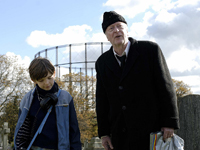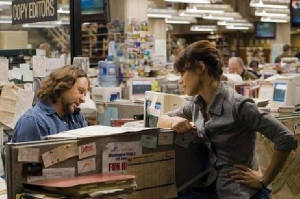|
Is Anybody There?

Directed by John Crowley
Written by Peter Harness
Cast: Michael Caine, Anne-Marie Duff, David Morrissey, Rosemary Harris, Elizabeth Spriggs, Bill Milner, Peter Vaughan,
Linzey Cocker, Ralph Riach, Sylvia Syms and Leslie Phillips
Running time: 1 hour 32 minutes
Bill Milner stars as Edward, a 10-year-old boy who begrudgingly lives in a nursing home. Prior to its intake of elderly ladies
and gentlemen, it was just Edward's house - but then, desperate to make a little extra money, his parents opened up their
home (and gave up Edward's bedroom) to the old and the senile. Edward resents his new housemates, and he avoids them (and
people in general) as much as he can. But he also uses them as experiments in the supernatural, recording their dying breaths
on a tape recorder, eager to find evidence of some kind of life after death. Needless to say, because of his morbid fascination,
he doesn't have a great many chums of his own age.
But Edward's quiet and almost reclusive existence changes when Clarence (Michael Caine) moves in. The ageing magician
doesn't want to be around crazy old codgers any more than Edward does, so the two eventually build an unlikely friendship.
While Clarence tries to persuade his young friend to get out and make friends, Edward tries to help his bitter old pal find
happiness.
Is There Anybody There? manages to find the perfect mix of heartstring-tugging drama and easy-going humour. The relationship
between the lonely young boy and angry old man is often touchingly beautiful - and sometimes it's even heartbreaking. But
Crowley injects lighter, amusing touches into the story at just the right moments (and in just the right doses) to keep the
film from feeling too heavy. The batty old ladies at the home (who, incidentally, are played by a number of accomplished,
and even legendary, British actresses) add the perfect amount of comic relief - as does na´ve and eccentric Edward. At times,
in fact, the writing is more than just clever; it's shockingly funny, and, as a result, you might just find yourself laughing
through your tears.
But I doubt that Is There Anybody There? would have been such a beautiful and magical film without the perfect cast. Milner,
the young actor, is a delight to watch. And Caine gives an award-worthy performance as the ageing magician who is filled with
anger and regret. The wonderful Anne-Marie Duff and David Morrissey are terrific as Edward's mum and dad. The downside is
the under-use of the superb British actors Leslie Phillips, Peter Vaughan, Sylvia Sims, Thelma Barlow, Elizabeth Spriggs and
Ralph Riach. Together, however, this loveable on-screen team makes Is There Anybody There? a delightful film that's sweet,
funny and memorable.
State Of Play

Director: Kevin MacDonald
Writers: Matthew Michael Carnahan, Paul Abbott
Cast: Russell Crowe, Rachel McAdams, Ben Affleck, Robin Wright Penn, Jason Bateman, Helen Mirren, Wendy Makkena, Rob Benedict,
Katy Mixon, Bonita Friedericy
Running time: 118 mins
State of Play is a victim of a complete lack of chemistry. Despite being a capable, intelligent, compelling thriller, the
film stumbles because the supposed lifelong friendship between stars Ben Affleck and Russell Crowe doesn't feel real. Not
only do Crowe and Affleck never seem like old friends, the palpable aura is that they've never previously met. So much so,
it actually seems feasible that all their shared scenes were shot at different times and digitally banged together.
It's hard to hold this against the actual film however. Director Kevin Macdonald and his small army of credited, very
capable writers (Matthew Michael Carnaha, Tony Gilroy and Billy Ray) have crafted a film that is smart, exciting without resorting
to outlandish action scenarios - and right up until the very last minute he had two great leads. Brad Pitt would have played
the Washington Globe reporter who discovers that his random double homicide story is connected to things much bigger than
he could have expected while Edward Norton was to play his old college chum, now a rising young politician whose career is
about to be derailed by a sex scandal.
No matter how well written the script, no matter how tense the direction, no matter how striking the cinematography and
no matter how good the acting, the entire film needs to have the chemistry between the leads be credible. It needs to let
this unspoken element do the communicating with us; we need to be able to see the leads in a scene together and not just sense
and understand their friendship but actually feel it - but that never happens. Pitt and Norton proved in the past that they
had that chemistry; I think even Pitt and Affleck (as was once the iteration) could have pulled it off. But Affleck and Crowe...
emptiness.
Affleck gives a good performance as a guy who really has the best of intentions but who allows extra marital romance to
get the better of him. He's shortchanged by the script, getting far less screen time than Crowe, which affects the viewer's
perception of his character. We never quite get a feel for this guy or what the stakes are for him; but even with the little
given him Affleck manages to radiate a fierce, wounded pride, being the epitome of a man who is furious that the good work
he is doing in Congress is about to be destroyed by a nonsense scandal. The outstanding original BBC series upon which this
is derivatively based, delves more into this character and his world; something that is sorely missing in the film version.
Crowe on the other hand is terrific. In recent films he's given me the impression of a actor simply coasting. There were
hints that he was again up for the challenge of acting in American Gangster, but that was about it since Master and Commander
and the sublime The Insider. State of Play however is a top role for him. Still sporting the weight I'll charitably pretend
he gained for Body of Lies, Crowe does rumpled reporter well, and his chemistry with Rachel McAdams, playing a cub reporter
who blogs for the Washington Globe, is sweet and believable.
The tension between blogs and newspapers is part of the undercurrent of State of Play. The film's essentially a newspaper
thriller, and it's aware of how anachronistic that is and TV news isn't even a blip on the radar of the struggling newspaper
- it's all about the threat of blogs and their looseness with facts and their desire for scoops. Much of the third act's climax
is based on beating a deadline and holding the front page, concepts that feel almost outdated in the internet world. More
people will read Crowe and McAdams' explosive story on the internet than on paper, and although there's nothing inherently
wrong with that, it feels like the immediacy of the internet is something that could have made for a great solution to a couple
of the third act obstacles that felt put there just to keep things from going too smoothly (such as the predictably bad new
corporate owners of the paper not wanting to run this potentially explosive story).
The supporting cast of State of Play is uniformly excellent. Helen Mirren is wonderful as the newspaper editor in chief
caught in between the desire to deliver solid news and the need to sell papers; Robin Wright Penn and Jeff Daniels play Affleck's
wife and mentor respectively, and they're also excellent. The standout supporting actor is Jason Bateman, playing a sleazy,
sexually promiscuous PR guy who might be the key to the whole mystery. He's funny while not violating the dramatic integrity
of the world a film like this creates and as such shows an incredible skill.
The dramatic arena that is created is one where the death throes of newspapers are a big cause for concern, as is the
privatisation of the USA military and the American Homeland Security. Both of these are serious issues that deserve attention,
but there's something weirdly stiff about the film's political concerns. Maybe because none of it feels new, which isn't quite
the fault of the piece, but it is the fault of the film that it can't quite make it compelling. The best parts of State of
Play as thriller come from the personal stakes as Crowe and McAdams get deeper into dangerous territory, but the scenes where
we're supposed to be outraged - such as the idea of private armies taking over Homeland Security contracts - on American soil
- feel like nothing more than a plot device. In the 1970s, in the heyday of the paranoid thriller, there was still a frisson
to the idea of claiming the government was the bad guy. Today both sides of the fence make that argument regularly; in fact,
the central conspiracy in State of Play reads like a right wing neocon theory. At the base of it any film would be hard pressed
to make US governmental misdeeds and cover ups feel all that shocking nearly 40 years after Watergate, but I wish State of
Play had tried harder.
In the end, with the right leading actors, all of these concerns would be niggling details. It's a shame for Kevin Macdonald
- he had a potential classic on his hands, but talent problems have led to him making simply a good, solid, respectable film.
Most films aspire to just that sort of thing, but it's obvious that State of Play could have been so much more . If you're
in any doubt - get a dvd of the BBC original - and see how it could and should be done.
|

